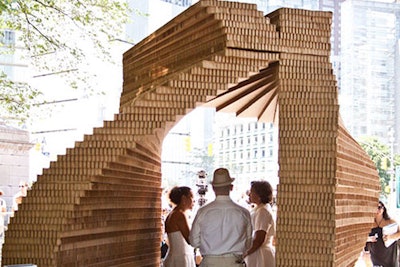
After New York State passed legislation to legalize same-sex marriage on June 24, 2011, designers, producers, and other companies in the city speculated that the new crop of brides and grooms could create a surge in the first six months.
But what was the reality? In the year since the change—which took effect July 24, 2011—has the industry seen a significant impact?
"I don't think we've seen a huge impact, to be honest, but it's still a little too early to tell," says Mike Warren, director of catering at CPS Events at the Plaza, which is responsible for renting the iconic hotel's grand ballroom, terrace room, and meeting spaces. "The law just passed a year ago, and we usually see weddings booked nine months or more in advance. We're starting to feel it now, but we didn't have any quick weddings last summer." In fact, according to Warren, the first "full-blown," legal same-sex wedding at the Plaza happened June 9.
Looking back, Shai Tertner, owner of design, catering, and planning company Shiraz Events, said his prediction of a dramatic, but short-lived boost in business was a little off the mark. "There was definitely a rise in inquiries, but it wasn't overwhelming," he said. "My phone didn't ring off the hook as soon as it was legal."
Bernadette Coveney Smith, the founder and president of 14 Stories, a company in Boston and New York that specializes in same-sex weddings, has seen business shift. "Now, of course, New York is the most appealing destination," she said. "We've seen a drop-off in our elopement packages in Massachusetts in the past year, which is one of the reasons we sell them in New York as well, so we can still catch that market. I can tell you that our overall sales have increased 50 percent."
Smith predicted New York will remain a key draw for gay weddings. "I don't think that's going to change, and, if anything, I think that number is going to jump," she said. "I think we're going to see more and more of the big weddings, full-on productions."
Some vendors have already worked on more heavily produced affairs. "I thought there really wasn't going to be material, but we've had some really decent projects show up that were gay weddings," says Bentley Meeker, owner of the eponymous lighting and production company. Last year, Meeker doubted the bill would change much in New York. "Boy, was I wrong! I just thought New Yorkers were New Yorkers and would do whatever they wanted no matter what—commitment ceremonies instead of weddings, and the like. But it mattered. I don't know if it has resulted in an uptick in our overall book of business because we do fair amount, but there's been some really nice projects that I know would not have come through had there not been this legislation."
Others are starting to notice trends emerge for same-sex weddings. "Because gay and lesbian couples are really breaking the mold, so to speak, it’s very interesting to see which traditions they choose to keep, which they choose to adapt and make their own, and which they choose to discard altogether," said Bronson van Wyck of Van Wyck & Van Wyck. Van Wyck described a current project that entails a small morning ceremony in a park followed by lunch at a neighborhood restaurant and a black-tie ball for 400 guests in the evening.
Olivier Cheng, owner of Olivier Cheng Catering & Events, said the gay weddings he has worked on have had a less formal aesthetic. "Food has been centered around the idea of one big party versus structured seated dinners," he said. "They seem much looser and less about doing it in what is the norm. [That could be a] smaller, more intimate ceremony earlier or right before, followed by a party, but not a sit-down dinner."
That's not to say that the weddings have been particularly over the top. With Tertner's clients, there's been "nothing gimmicky or too overboard," he said. "They don't want the glitz and the glamour, just a great celebration."
Perhaps the most noticeable result of the law is how quickly the industry—and the wider community—adapted. "While my business hasn’t been greatly impacted, what is refreshing to see is how swiftly gay marriage has become part of the norm," said David Bowen, whose event firm, Bowen & Company, launched a wedding division last year. "I love opening The New York Times and seeing and reading about the gay and lesbian couples who are marrying. They look just like everyone else: in love."



















